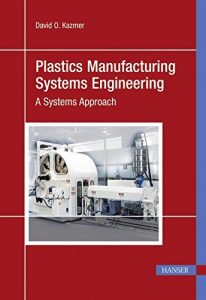Plastics Manufacturing Systems Engineering
Plastics Manufacturing Systems Engineering
Plastics Manufacturing Systems Engineering is a highly interdisciplinary endeavor requiring knowledge related to materials science, physics, engineering, and management. Because of this diversity, the plastics process engineer interacts with many stakeholders including customers, designers, materials suppliers, machine builders, mold/die suppliers, systems integrators, operators, quality engineers, managers, and others. With so many stakeholders involved, it isn’t surprising that many plastics manufacturing processes are not precisely engineered systems. The resulting processes can be poorly designed, requiring too much investment to achieve too little productivity. This book was written to educate and support plastics processing engineers, but it is also highly useful to others involved with plastics manufacturing who are performing process development, research, and even machinery design. A manufacturing systems engineering approach used to provide guidance as an integrated system with broadly applicable analysis of the underlying subsystems.
You can also Read Applied Plastics Engineering Handbook: Processing, Materials, and Applications, Second Edition
Plastics Manufacturing Systems Engineering Content
- Dedication
![Plastics Manufacturing Systems Engineering]()
- Acknowledgement
- Preface
- Background
- Plastics Manufacturing Systems
- Heating and Cooling
- Hydraulics and Pneumatics
- Electric Drives
- Process Sensors
- Signal Conditioning
- Data Acquisition Systems
- Machine Controllers
- Process Control
- The Process Characterization
- Process Optimization
- Quality Control
- Automation
- Appendixes
- A: Statistical Labor Data
- B: Material Properties
- C: Unit Conversions
- D: Matlab Primer
- Bibliography
- Index
In industry practice, value engineering techniques have consistently found that plastic components provide high function per unit cost [1], motivate further materials development [2], and have undergone “explosive” growth [3]. Such commercial growth, however, has permitted inefficiencies in plastics manufacturing that are no longer acceptable in the marketplace. Current issues now threatening plastics manufacturers include continued global competition [4], increases in feedstock and commodity prices [5], and surging environmental awareness [6]. As a result, plastics manufacturing systems need to be well engineered, make optimal use of human and natural resources, and provide competitive yet socially responsible solutions.


Comments are closed.